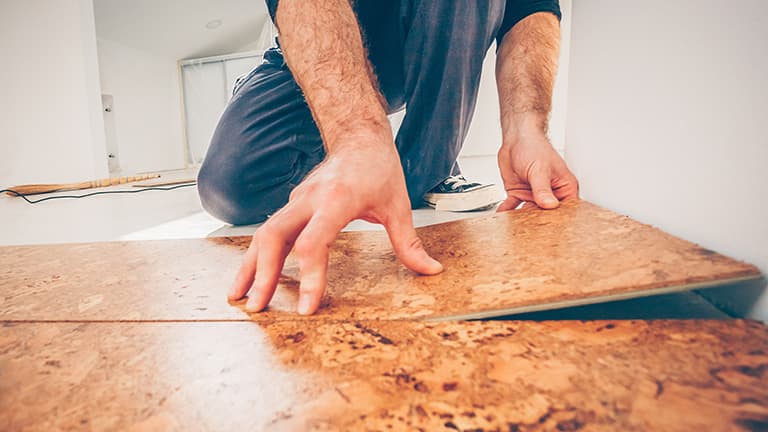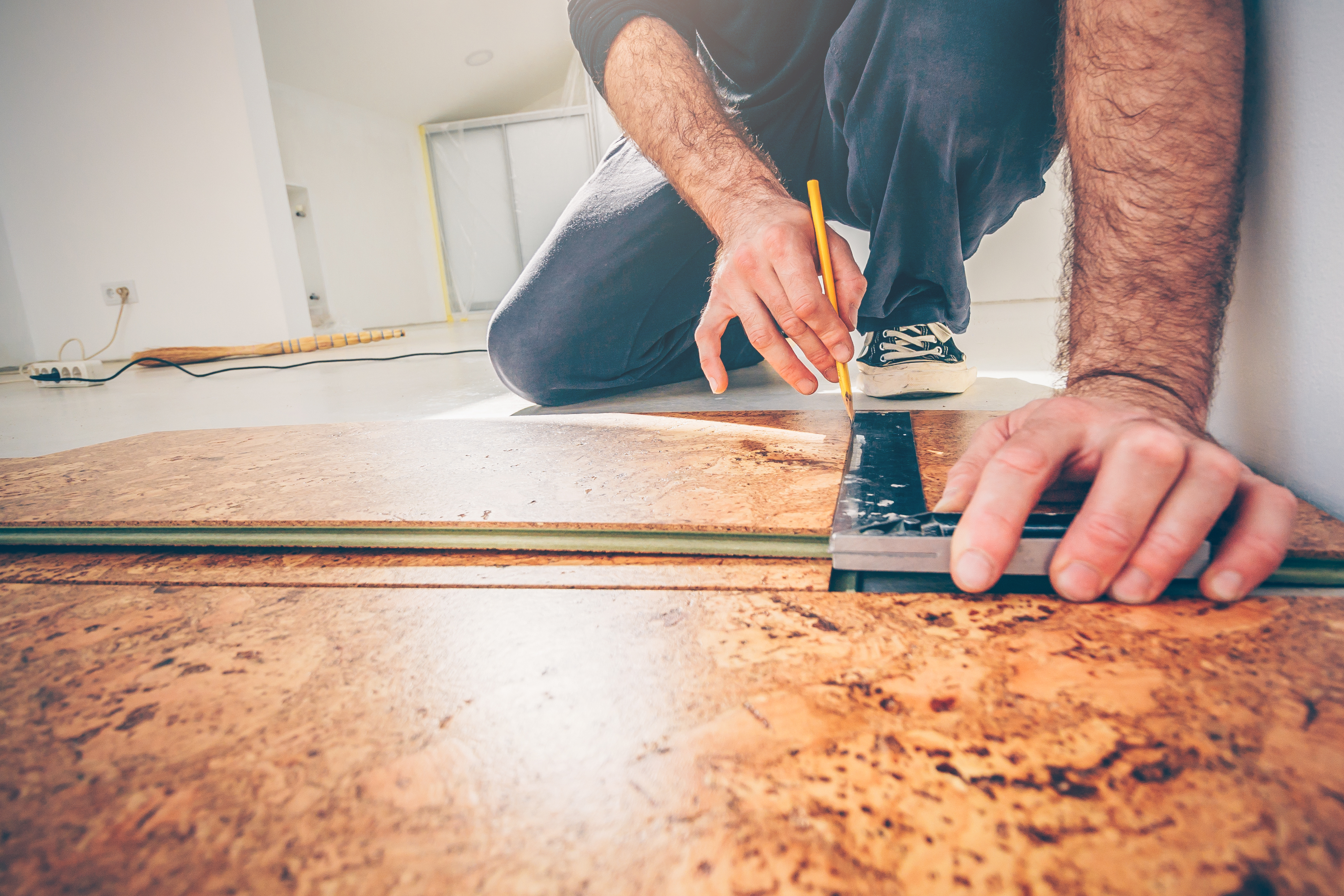Cork flooring is becoming an increasingly popular choice for homeowners who are looking for a natural, eco-friendly flooring option. With its many benefits and few downsides, it’s easy to see why cork is quickly becoming a top contender in the flooring industry. In this article, we’ll take a closer look at the pros and cons of cork flooring, so you can make an informed decision when choosing the right flooring for your home.
Pros of Cork Flooring
- Natural Insulation
One of the most notable benefits of cork flooring is its natural insulation properties. Cork is made up of tiny air pockets, which help trap heat and sound inside, making it a great option for homes in colder climates. Additionally, cork is an excellent sound barrier, making it ideal for use in home theaters or for those who live in noisy apartment buildings.
- Comfortable and Soft
Cork flooring is soft and bouncy, making it comfortable to walk and stand on for long periods of time. This is due to the air pockets within the cellular structure of cork, which give it its soft and cushiony feel. Plus, cork is naturally resistant to moisture, making it a great choice for bathrooms and kitchens where spills are common.
- Easy to Maintain
Cork floors are incredibly easy to clean and maintain. You don’t need any special cleaning products – just sweep up any dirt or dust with a broom or vacuum, and then mop with a damp cloth. Cork is also naturally resistant to mold, mildew, and bacteria, so it’s a great option for those with allergies or respiratory issues.
- Hypoallergenic
As mentioned, cork is naturally resistant to mold, mildew, and bacteria, making it hypoallergenic. It’s an ideal choice for those with asthma or allergies, as it won’t aggravate respiratory issues.
- Renewable and Sustainable
Cork is a sustainable material that is harvested from cork oak trees. Unlike other types of wood flooring, no trees are cut down during the harvesting process. Instead, the bark is stripped off the tree, which then regenerates, allowing for future harvests. This makes cork flooring an eco-friendly choice for those who are looking for a more sustainable flooring option.
- Durable
Cork is a very durable material and can last for many years with proper care. It’s actually the same material used to make wine corks, which can last for decades. Plus, cork is naturally resistant to water, making it a great option for kitchens and bathrooms.
Cons of Cork Flooring
- Not Waterproof
While cork is naturally resistant to water, it’s not waterproof. This means that it’s not the best choice for areas with a lot of moisture, such as bathrooms or laundry rooms.
- Not Fireproof
Cork is not fireproof and can be a fire hazard if not properly treated. If you plan on using cork flooring in your kitchen, make sure to have a fire extinguisher nearby.
- Not Scratch Resistant
Cork flooring is not very scratch-resistant and can be easily damaged by heavy foot traffic or pet claws. This makes it a less-than-ideal option for high-traffic areas.
- Not Stain Resistant
Cork flooring can be stained by liquids, such as wine or water. While spills should be cleaned up immediately, it’s important to note that cork flooring is not very stain-resistant.
Conclusion
Overall, cork flooring is a great option for those who are looking for an eco-friendly, comfortable, and easy-to-maintain flooring option. While it’s not perfect, its many benefits far outweigh its few downsides. With proper care, cork flooring can last for many years and provide a comfortable and sustainable floor.

Cork Flooring Pros and Cons
Cork Flooring: What Are the Pros u0026 Cons?
Cork Flooring Pros and Cons
Pros and Cons of Cork Flooring – Is It Right for You? – Bob Vila
The Pros and Cons of Cork Flooring FlooringStores
Doesnu0027t Come With Wine: The Pros (and Cons) of Cork Floors
Cork Flooring Pros and Cons Americau0027s Floor Source
Cork vs. Bamboo Flooring: Whatu0027s Better for Your Project?Learning
Cork Flooring: Pros, Cons and Alternatives – Home Stratosphere
Using Cork Floor Tiles in Your Kitchen
Find Your Edgy Style in Home Designing: Cork Flooring Pros and Cons
Cork Flooring In A Kitchen – Pros, Cons u0026 Everything Explained
Related Posts:
- Commercial Cork Flooring Tiles
- Cork Tiles For Basement Floor
- Cork Flooring Laundry Room
- Cork Floor Insulation
- Natural Cork Floor Tiles
- Cork Flooring Bedroom
- Radiant Heat Under Cork Floor
- Cork Flooring For Kitchen
- Cork Flooring Strips
- Cork Flooring Cheapest
Cork Flooring: The Pros and Cons for Kitchens
Cork flooring is a unique and intriguing type of flooring that can be used in kitchens. It has many advantages, but also some drawbacks that must be considered before making a purchase. This article will discuss the pros and cons of cork flooring in kitchens, as well as provide answers to some common questions about this type of flooring.
Advantages of Cork Floors in Kitchens
One of the biggest advantages of cork flooring is that it is highly durable and able to withstand heavy foot traffic. Its natural elasticity helps cushion the impact of footsteps and prevents wear and tear that can occur with other types of flooring. Cork also has a high resistance to moisture, which helps protect it from spills and other liquids that can damage other floors. Additionally, cork is a natural insulator, which makes it great for keeping heat in during colder months.
Cork floors are also easy to install and maintain. They are available in both planks and tiles, allowing for easy installation. They are also easy to clean and maintain, with regular sweeping or vacuuming being all that is needed to keep them looking great.
Finally, cork flooring has a unique look that can add charm and character to any kitchen design. The natural texture of cork creates an interesting visual pattern that is both beautiful and practical.
Disadvantages of Cork Floors in Kitchens
The biggest disadvantage of cork flooring is its cost. While it is generally less expensive than hardwood floors, it tends to be more expensive than other types of flooring such as vinyl or linoleum.
Cork floors are also more prone to staining than other types of flooring. They can be stained by acidic liquids such as wine or citrus juice, which can discolor the surface if not wiped up quickly enough. Additionally, cork floors can be scratched by sharp objects such as pet claws or high-heeled shoes, so care must be taken when walking on them.
Finally, cork floors may not be suitable for large kitchens with lots of foot traffic as they may not hold up under the strain. Additionally, they can be damaged if exposed to standing water for long periods of time, so they may not be suitable for areas of high humidity or frequent spills.
FAQs About Cork Floors in Kitchens
Q: How much does cork flooring cost?
A: The cost of cork flooring varies depending on the type and quality you choose. Generally speaking, it tends to be more expensive than other types of flooring such as vinyl or linoleum but less expensive than hardwood floors.
Q: Is cork flooring durable?
A: Yes, cork flooring is highly durable and able to withstand heavy foot traffic due to its natural elasticity. It is also resistant to moisture which helps protect it from spills and other liquids that can damage other floors.
Q: Is cork flooring difficult to install?
A: No, cork flooring is relatively easy to install due to its availability in both planks and tiles. It is lightweight and easy to work with compared to other types of flooring.
Q: Can cork floors be scratched?
A: Yes, cork floors can be scratched by sharp objects such as pet claws or high-heeled shoes so care must be taken when walking on them. Additionally, they may not hold up well under heavy foot traffic so they may not be suitable for larger kitchens with lots of foot traffic.
:max_bytes(150000):strip_icc()/cork-flooring-pros-and-cons-1314688_cleaning_0040-d62159c2ce18440a9f2f035e64a9ac25.jpg)

:max_bytes(150000):strip_icc()/cork_0599-467e613eff8f477d9505875f69626459.jpg)






/cork-flooring-in-unfurnished-new-home-647206431-57e7c0c95f9b586c3504ca07.jpg)

